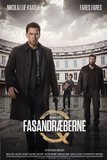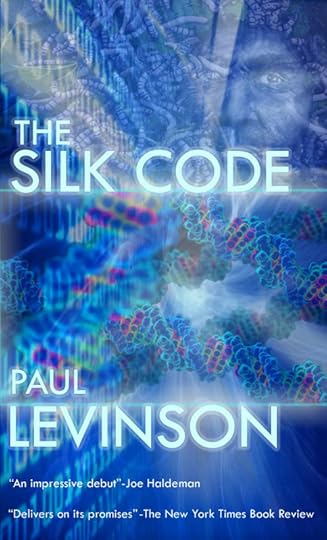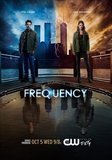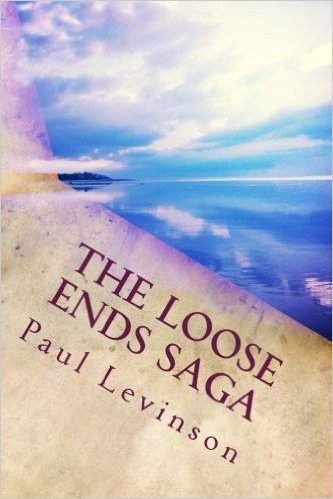Paul Levinson's Blog: Levinson at Large, page 235
December 5, 2016
Timeless 1.9: The Kiss and the Key
 A good Timeless 1.9 tonight, as our team goes back to the time of Bonnie and Clyde in the 1930s, to fetch a key of some importance that Bonnie has around her neck.
A good Timeless 1.9 tonight, as our team goes back to the time of Bonnie and Clyde in the 1930s, to fetch a key of some importance that Bonnie has around her neck.Lucy and Wyatt don't get the key, but they do get to kiss, on behalf of maintaining their covers, and that's good to see. Wyatt also tells how he proposed to his real fiancee, in another reality, lost in this one, and that's an effective scene, too. All of this brings Lucy and Wyatt closer, and we also get a good line from Rufus - who says he's Wesley Snipes (continuing the tradition of Timeless, in which Wyatt's ID in an earlier episode says he's Mulder from the X-Files) - making this adventure worthwhile, even though our team doesn't recover the key, or stop Bonnie and Clyde from being riddled with bullets by lawmen (with Flynn "helping" the lawmen).
Flynn gets the key, and uses it to find a message in the future. It all has something to do with Rittenhouse, as everything does in one way or another in this series. Unfortunately, the leisurely nature of network television series, and Timeless in particular, gives us very little progress in any episode in unlocking the central mystery.
But there are some signs that we'll learn more soon. Denise is beginning to close in. It's not clear if she's on the side the heroes or the villains, but any motion in the exec team in our present is good to see in this show. Here's what may be a missing piece of the puzzle - or a clue to the key to what's going on: why is it that only some trips to the past cause profound changes in the present of our major characters, such as Lucy losing her sister and gaining a fiancee and regaining her mother? In contrast, tonight's trip apparently changed nothing for Lucy - and not for Wyatt or Rufus, either.
Looking forward to more.
See also Timeless 1.1: Threading the Needle ... Timeless 1.2: Small Change, Big Payoffs ... Timeless 1.3: Judith Campbell ... Timeless 1.4: Skyfall and Weapon of Choice ... Timeless 1.5: and Quantum Leap ... Timeless 1.6: Watergate and Rittenhouse ... Timeless 1.7: Stranded! ... Timeless 1.8: Time and Space

a time-travel agency in Riverdale ....
Paul Levinson's books ... Paul Levinson's music
Published on December 05, 2016 22:47
The Walking Dead 7.7: Negan and the Kids
 A truly chilling episode 7.7 of The Walking Dead last night. It contained one viscerally horrendous scene when Negan melts someone's face off with a hot iron, but the real horror was a much quieter and ultimately more effective one.
A truly chilling episode 7.7 of The Walking Dead last night. It contained one viscerally horrendous scene when Negan melts someone's face off with a hot iron, but the real horror was a much quieter and ultimately more effective one.Negan captures Carl, and continues showing something of a fatherly liking of him. He instructs Carl on the male camaraderie practice of "breaking balls," and gives him all kinds of other helpful advice. By any rights, he should kill Carl, who tried to kill Negan and did kill two of his men. But Negan is taken by Carl, and drawn to him in his quintessentially sick but still paternal way - in a way, at least.
Carl's reaction is even more interesting. He hates Negan and still wants to kill him, of course. But is a part of Carl appreciating the education that Negan is trying to give him - an education in some of the aspects of life that, for whatever reason, Rick has not yet been able to give his son? Hard to say, but Darrell's simmering revulsion to all of this clearly apparent, while Carl's is not quite.
And the concluding scenes of this episode ramp up this track yet another quietly maddening and revolting notch. Negan's on the porch with Judith on his lap, in a rocking chair, with Carl seated next to them, and both sipping lemonade.
You couldn't ask for a more normal yet deeply wrong scene, precisely the kind that most raises the hackles in your soul. In its constant quest to provide a cocktail of horror and normalcy in this post-apocalyptic world, The Walking Dead last night provided a truly unforgettable tableau.
See also: The Walking Dead 7.1
And see also: The Walking Dead 6.1: The Walking Herd ... The Walking Dead Season 6 Finale: Who Was It?
And see also: The Walking Dead 5.1: The Redemption of Carole ... The Walking Dead 5.3: Meets Alfred Hitchcock and The Twilight Zone ... The Walking Dead 5.4: Hospital of Horror ... The Walking Dead 5.5: Anatomy of a Shattered Dream ... The Walking Dead 5.6-7: Slow ... The Walking Dead 5.8: Killing the Non-Killer ... The Walking Dead 5.9: Another Death in the Family ... The Walking Dead 5.11: The Smiling Stranger ... The Walking Dead 5.12: The Other Shoe ... The Walking Dead 5.13: The Horse and the Party ... The Walking Dead 5.15: The Bad Guy ... The Walking Dead Season 5 Finale: Morgan and Optimism
And see also The Walking Dead 4.1: The New Plague ... The Walking Dead 4.2: The Baby and the Flu ... The Walking Dead 4.3: Death in Every Corner ...The Walking Dead 4.4: Hershel, Carl, and Maggie ... The Walking Dead 4.6: The Good Governor ... The Walking Dead 4.7: The Governor's Other Foot ... The Walking Dead 4.8: Vintage Fall Finale ... The Walking Dead 4.9: A Nightmare on Walking Dead Street ... The Walking Dead 4:14: Too Far ... The Walking Dead Season 4 Finale: From the Gunfire into the Frying Pan
And see also The Walking Dead 3.3 meets Meadowlands ... The Walking Dead 3.4: Going to the Limit ... The Walking Dead 3.9: Making Crazy Sense ... The Walking Dead 3.10: Reinforcements ... The Walking Dead 3.11: The Patch ... The Walking Dead 3.12: The Lesson of Morgan ... The Walking Dead 3.13: The Deal ... The Walking Dead 3.14: Inescapable Parable ... The Walking Dead 3.15: Merle ... The Walking Dead 3.16: Kill or Die, or Die and Kill
And see also The Walking Dead Back on AMC ... The Walking Dead 2.2: The Nature of Vet ... The Walking Dead 2.3: Shane and Otis ... The Walking Dead 2.4: What Happened at the Pharmacy ... The Walking Dead 2.6: Secrets Told ... The Walking Dead 2.7: Rick's Way vs. Shane's Way ... The Walking Dead 2.8: The Farm, the Road, and the Town ... The Walking Dead 2.9: Worse than Walkers ... The Walking Dead 2.11: Young Calling the Shots ... The Walking Dead 2.12: Walkers Without Bites ... The Walking Dead Season 2 FinaleAnd see also The Walking Dead 1.1-3: Gone with the Wind, Zombie Style ... The Walking Dead Ends First Season
#SFWApro

a different plague here
Paul Levinson's books ... Paul Levinson's music
Published on December 05, 2016 21:08
December 4, 2016
The Affair 3.3: Who Attacked Noah?
 Having solved the mystery of who killed Scotty - and how and why - at the end of the second season, The Affair in episode 3.3 now pitches us fully into a new crime narrative: who attacked Noah, nearly killed him, and why?
Having solved the mystery of who killed Scotty - and how and why - at the end of the second season, The Affair in episode 3.3 now pitches us fully into a new crime narrative: who attacked Noah, nearly killed him, and why?The question takes form in the second half hour, Noah's half hour, in which we're fully introduced to Noah's prison guard, who has a grievance and a violent temper. But, I don't know, he seems like too obvious a choice at this early point in the story. So who else might have stabbed Noah?
Well, the detectives are suspicious of Cole, as indeed they should. Who else? The guy at Juliette's dinner, who maybe resents Noah because of the way Juliette, and for that matter Audrey, looks at Noah and admires his work? (It's grudging in the case of Audrey, but she's clearly attracted to him.) So, maybe. And while we're on the subject, are we sure that Noah's assailant was a man, and not Audrey herself? Actually, no one other than the prison guard and Cole are even remotely likely, but you just never know.
I haven't included Juliette on the list of subjects - she'd have to be a real psycho to go to Noah's apartment, stab him, and then go back again and be surprised to find him bleeding out and save him - she'd need to be a full-fledged schizophrenic. But she's certainly a full-fledged character now, with her own named half hour to start this episode and everything.
And it's an interesting half hour, too, beginning with her masturbating to Noah's novel, then letting the guy at Juliette's dinner take her from behind. And she saves Noah - which, if you think about it, is one of the most important events in the three seasons so far.
I think she and Noah would make a good couple. But ... Audrey wants to sleep with him, and we haven't even seen Alison and Noah have as much as a conversation.
Good, provocative times ahead!
See also The Affair 3.1: Sneak Preview Review ... The Affair 3.2: Sneak Preview Review: Right Minds
And see also The Affair 2.1: Advances ... The Affair 2.2: Loving a Writer ... The Affair 2.3: The Half-Wolf ... The Affair 2.4: Helen at Distraction ... The Affair 2.5: Golden Cole ... The Affair 2.6: The End (of Noah's Novel) ... The Affair 2.7: Stunner ... The Affair 2.8: The Reading, the Review, the Prize ...And see also The Affair Premiere: Sneak Preview Review ... The Affair 1.2: Time Travel! ... The Affair 1.3: The Agent and the Sleepers ... The Affair 1.4: Come Together ... The Affair 1.5: Alison's Episode ... The Affair 1.6: Drugs and Vision ... The Affair 1.7: True Confessions ... The Affair 1.8: "I Love You / I Love You, Too" ... The Affair 1.9: Who Else on the Train? ... The Affair Season 1 Finale: The Arrest and the Rest
podcast review of every 2nd season episode
podcast review of every 1st season episode



the Sierra Waters time-travel trilogy
Paul Levinson's books ... Paul Levinson's music
Published on December 04, 2016 23:12
Westworld Season 1 Finale: Answers and Questions
 Here's what we learned in the excellent season 1 finale of Westworld, and the possible questions raised:
Here's what we learned in the excellent season 1 finale of Westworld, and the possible questions raised:1. The Man in Black is the new majority owner of Westworld.
2. The Man in Black is William, much older. This is one of the first fine twists - a sequence of turns and revelations of events that cut deep. What we've been seeing of Dolores during these ten episodes are not just skips and jumps and loops in her mind, but time itself chopped up, that is, earlier and more recent events in her life. Meaning, regarding William, that every scene we've seen with him happened in the pretty distant past - i.e., decades ago. Nice touch.
3. Dolores dying in Teddy's arms by the sea is actually the entree to the new narrative Ford has been promising. I actually realized this a few moments before it was revealed, but it was still nice to see.
4. Maeve, despite her best efforts, was never going to leave Westworld. I was actually thinking this, too - the essence of Westworld is that, like the Hotel California, you can check in if you're a host (be created), but you can never leave. But the pursuit of her daughter being the reason is an effective touch - because, after all, not only does love conquer all, but it's all a powerful component of what makes us human.
5. The path towards consciousness is knowing thyself. In the Jaynesian bicameral mind - at least, as portrayed in Westworld - this means one half of your brain listening to the other. Two millennia prior to Jaynes, Socrates urged the same thing: know thyself. This makes Westworld not only Jaynesian but Socratic, a good thing in my book.
6. I never bought that Socrates drank the hemlock, though (and my best-known novel tries to explain what may really have happened back then) - but, with that in mind, I wasn't happy to see Dolores blow out Ford's brains at the end, just as she had done years earlier with Arnold (even though suffering that real-guilt pain is said to be only way she can achieve true consciousness).
And here's is where some questions for the next season come in. Will Anthony Hopkins return next year as a Ford-host by whatever name, just as Arnold did with Bernard? Hard to say, since Ford is not around any more to build a new version of him, just as Ford did with Bernard - and Arnold. On the other hand, Bernard is no slouch, and he may have indeed have the capability (and his success in recreating Ford would also be another testament to Ford's as well as Arnold's genius, since Ford built Bernard). I certainly hope we see Ford again in some form, given the tour-de-force just wonderful performance this year by Hopkins (one of the best of his long and superb career, I'd say).
Also not 100% clear is what happened to the Man in Black aka old-William at the end. Was that attacking force of presumably hosts armed with weapons that could kill him? Maybe, probably, since it takes real death for the hosts to learn ... but you never know.
Anyway, this was the best television series ever about androids, and one of the best ever of science fiction, periods. Kudos to all the writers, producers, actors and actresses, and HBO. I learned a lot as well as enjoyed this series - and the only deaths I had to deal with regarding Westworld were those on the screen.
See also Westworld 1.1: Isaac Asimov and Philip K. Dick Served Up by Jonathan Nolan, Lisa Joy, and J. J. Abrams ... Westworld 1.2: Who Is the Man in Black? ... Westworld 1.3: Julian Jaynes and Arnold ... Westworld 1.4: Vacation, Connie Francis, and Kurt Vonnegut ... Westworld 1.5: The Voice Inside Dolores ... Westworld 1.6: Programmed Unprogramming ... Westworld 1.7: The Story of the Story ... Westworld 1.8: Memories ... Westworld 1.9: Half-Truths and Old Friends

another kind of capital punishment
#SFWApro
Paul Levinson's books ... Paul Levinson's music
Published on December 04, 2016 20:07
The Department Q Trilogy on Netflix: Outstanding!
 Continuing our binge watching of superb Scandinavian crime drama (aptly known as Nordic Noir) on Netflix, we caught a trilogy of movies, based on the novels of Jussi Adler-Olsen - The Keeper of Lost Causes (2013), The Absent One (2014) and A Conspiracy of Faith (2016). This Department Q Trilogy, as these novels and movies are known, was flat-out superb!
Continuing our binge watching of superb Scandinavian crime drama (aptly known as Nordic Noir) on Netflix, we caught a trilogy of movies, based on the novels of Jussi Adler-Olsen - The Keeper of Lost Causes (2013), The Absent One (2014) and A Conspiracy of Faith (2016). This Department Q Trilogy, as these novels and movies are known, was flat-out superb! We've seen a fair number of "cold case" television series in the past few years, mostly from England and the U.S. But these Department Q tales have something more, in terms of intensity and originality of characters, and depth of stories, which range from a woman kidnapped and held in a pressure chamber for several years, to a group of rich kids in school gone very wrong, to a faith-based psycho. The last two themes are also familiar, but there's nothing familiar about the way they're laid out and developed in these three memorable movies.
We've seen a fair number of "cold case" television series in the past few years, mostly from England and the U.S. But these Department Q tales have something more, in terms of intensity and originality of characters, and depth of stories, which range from a woman kidnapped and held in a pressure chamber for several years, to a group of rich kids in school gone very wrong, to a faith-based psycho. The last two themes are also familiar, but there's nothing familiar about the way they're laid out and developed in these three memorable movies. The cast is completely unknown to me and I suspect most American viewers, with the exception of Fares Fares, who played a small but pivotal role in the late, lamented Tyrant on FX. He's even better in the Department Q trilogy, playing Assad, the partner of Carl, also well played by Nikolaj Lie Kaas. Carl is on the verge of being burned out, for a variety of reasons. His boss barely tolerates him, and he has no luck with women. But he has a heart of a gold and an indomitable spirit, and is exactly the kind of detective you'd want on your side if your case or cause was hopeless.
The cast is completely unknown to me and I suspect most American viewers, with the exception of Fares Fares, who played a small but pivotal role in the late, lamented Tyrant on FX. He's even better in the Department Q trilogy, playing Assad, the partner of Carl, also well played by Nikolaj Lie Kaas. Carl is on the verge of being burned out, for a variety of reasons. His boss barely tolerates him, and he has no luck with women. But he has a heart of a gold and an indomitable spirit, and is exactly the kind of detective you'd want on your side if your case or cause was hopeless.American series have tried to emulate narratives like these, with new, American productions of The Killing and The Bridge, which were both very successful in their original European productions. The American productions had their moments - I reviewed both of them in this blog - but also had their flaws, and now I intend to see the originals whenever I can. You do have to pay attention to the subtitles in the Department Q Trilogy and all the Scandinavian productions but it's worth it - and if you speak a little Yiddish, you'll get some of the words (common roots of German and Scandinavian), not to mention occasional English words like "ok" and some choice expletives thrown in.
 Paul Levinson's books ... Paul Levinson's music
Paul Levinson's books ... Paul Levinson's music
Published on December 04, 2016 16:11
December 3, 2016
MSNBC Still Getting Its (Post) Election Coverage Wrong
I know this may be beating a dead horse, but I couldn't help noticing the following in the past few days -
MSNBC offered extensive analysis of the verbal confrontation at Harvard University earlier this week between leaders of the Clinton and Trump presidential campaigns. There's no video available available, but plenty of audio, and in case you haven't heard it, here's four minutes of it.
The exchange has been aptly described by MSNBC and everyone as "raw" and unprecedentedly acrimonious, which it certainly was.
MSNBC commentators further noted that both sides were defensive, it was too soon after such a contested election for a courteous discussion of what happened and why, etc - in other words, a continuation MSNBC of the equivalence of the Trump and Clinton candidacies, which typified its coverage of the campaign and now apparently its aftermath. That's unfortunate, since the two candidacies were in almost no sense equivalent.
Missing from MSNBC's assessment of the Harvard panel was a discussion - even an acknowledgment - of the horror that the Clinton campaign now feels at the electoral college results of this election, in which someone with the least experience for the job in our history has been elected President - someone who has said all the things Trump has said about immigrants, women, and minorities - someone with white supremacist ties so strong that he's appointed Steve Bannon to a powerful White House position - and the list of frightening and outrageous statements and now appointments which go on and on.
There are many reasons why Clinton lost the electoral vote (and still a tiny chance that the recounts will change that), but the poor media coverage, which deliberately or not boosted Trump to legitimacy by presenting him as an equivalent candidate to Clinton when he was not on any level, is certainly one of the contributing factors.
I can only hope that this changes - at least in progressive media such as MSNBC - when Trump assumes the office in January. There's never been a time in our nation's history when we required an aggressive, watchdog press, as envisioned by our founders, more than we do now.
another reason Trump got so many votes Paul Levinson's books ... Paul Levinson's music
MSNBC offered extensive analysis of the verbal confrontation at Harvard University earlier this week between leaders of the Clinton and Trump presidential campaigns. There's no video available available, but plenty of audio, and in case you haven't heard it, here's four minutes of it.
The exchange has been aptly described by MSNBC and everyone as "raw" and unprecedentedly acrimonious, which it certainly was.
MSNBC commentators further noted that both sides were defensive, it was too soon after such a contested election for a courteous discussion of what happened and why, etc - in other words, a continuation MSNBC of the equivalence of the Trump and Clinton candidacies, which typified its coverage of the campaign and now apparently its aftermath. That's unfortunate, since the two candidacies were in almost no sense equivalent.
Missing from MSNBC's assessment of the Harvard panel was a discussion - even an acknowledgment - of the horror that the Clinton campaign now feels at the electoral college results of this election, in which someone with the least experience for the job in our history has been elected President - someone who has said all the things Trump has said about immigrants, women, and minorities - someone with white supremacist ties so strong that he's appointed Steve Bannon to a powerful White House position - and the list of frightening and outrageous statements and now appointments which go on and on.
There are many reasons why Clinton lost the electoral vote (and still a tiny chance that the recounts will change that), but the poor media coverage, which deliberately or not boosted Trump to legitimacy by presenting him as an equivalent candidate to Clinton when he was not on any level, is certainly one of the contributing factors.
I can only hope that this changes - at least in progressive media such as MSNBC - when Trump assumes the office in January. There's never been a time in our nation's history when we required an aggressive, watchdog press, as envisioned by our founders, more than we do now.
another reason Trump got so many votes Paul Levinson's books ... Paul Levinson's music
Published on December 03, 2016 13:02
December 2, 2016
Mars 1 and 2 on National Geographic: New Kind of Helping Hand Into Space
 Just caught the first two episodes of Mars on National Geographic, and wanted to post this review before I see and review more.
Just caught the first two episodes of Mars on National Geographic, and wanted to post this review before I see and review more.First, this series is a great amalgam of documentary - up to and including events in 2016 - and a drama about the first expedition to Mars with humans in 2033. That's a great idea for a story, and it works very well on screen.
The main of the part of the documentary, so far, is Scott Kelly's year in space mission, which ended successfully in March 2016. This is counterpoint to the 2033 mission to Mars, in which team leader Ben Sawyer is badly injured right before landing and ... well, I won't tell you how that works out, because that's the main personal drama in the first two episodes.
But the point of this new kind of docudrama is that the personal stories are part of the bigger story, the yearning and necessity of human beings getting off this planet, and successfully settling on another planet - in this case, Mars. Not a complete migration by any means, but establishing enough of a continuing existence to insure our survival if and when something catastrophic happens to Earth. As Elon Musk of Space X and other worthy fame says in the first episode, this is the only way to insure our survival - since catastrophes happening to both Earth and Mars at the same time are extraordinarily unlikely.
The cinematography in both 2016 and 2033 is stunning. We've seen all kinds of fictional accounts of space travel - ranging from The Martian to Star Trek - and all kinds of docudramas, such as Apollo 13. I've loved all of them, both as riveting stories in their own right, and as vehicles to getting our imaginations in better gear to actually get further off this planet and out into space.
We'll need all the help we can get, and its good to see Mars now lending a big, bold, imaginative helping hand.

Paul Levinson's books ... Paul Levinson's music
Published on December 02, 2016 18:54
Case on Netflix: The Seamy Side of Iceland
 Back with another review of another series I just streamed on Netflix - hey, that's an indication of how many good series Netflix is making available. This one is a police and lawyer story that takes place in Iceland - in Icelandic, with subtitles. But I actually enjoy a subtitled television series every once in a while.
Back with another review of another series I just streamed on Netflix - hey, that's an indication of how many good series Netflix is making available. This one is a police and lawyer story that takes place in Iceland - in Icelandic, with subtitles. But I actually enjoy a subtitled television series every once in a while.Now, I've never been to Iceland - I certainly hope to someday - but I tended to think Iceland was an idyllic community, with a life as clean and good as the virgin snow. Well, not quite - but I certainly wouldn't have expected to find a realm of hard drug use, prostitution, and child porn to rival that found in many big American cities.
Case is all about that, and more. It's actually the third season of a story of police and lawyers (though it's billed as the first season), which consisted of standalone episodes (like, say, Law and Order), but in the third season went for one continuous, seamless story (which I guess is why it's identified as the first season). And a seamy, often brutally hard-hitting story it was.
Many of the major characters are in the earlier seasons, but you can pick up their back stories quickly enough in the one season (the third season) now on Netflix. The story ultimately is a whodunit - the "it" being the drugging and sexual abusing including rape of high school girls in Iceland. The cast consists of actors and actresses completely unknown to me, and all did a very good job.
I won't tell you who the villain is, because that's a pretty good twist. But I will say Case will keep you on the edge of your seat, and is well worth your viewing on a snowy evening or otherwise.
 Paul Levinson's books ... Paul Levinson's music
Paul Levinson's books ... Paul Levinson's music
Published on December 02, 2016 14:44
The Fall Season 3: Delving into Homicide
 I binge-watched The Fall Season 3 on Netflix this week, and found it superbly disturbing and brilliant, the best of the three seasons. [Big spoilers follow.]
I binge-watched The Fall Season 3 on Netflix this week, and found it superbly disturbing and brilliant, the best of the three seasons. [Big spoilers follow.]The story in all three seasons pits Stella Gibson, brought into Belfast to investigate serial killings done by Paul Spector, who seems like the sweetest guy in the world. Both parts are played to perfection - by Gillian Anderson and Jamie Dornan - and Anderson's performance is one of the most powerful I've ever seen on any television or movie screen.
There's plenty of action, but what makes this series special are the deeper moments of contemplation and reflection. Gibson nails her suspects, at last, at the end of the second season, but the match of wits continues and escalates in the third season, as Spector evinces amnesia, presumably brought on by the trauma of his capture, which nearly kills him.
Is he feigning or really suffering a memory loss, which would make his prosecution in court much more difficult. Gibson is sure he's feigning, the medical and psychology staff - and we the audience - are not so sure.
The doctors in intensive care, Spector's nurse in particular, are correctly devoted to bringing this monster back to full health. The head of psychiatric facility to he's brought wants only to find the truth of what's going on now in Spector's brain.
This of course is connected to what went on in his brain before. I've seen many examinations of the homicidal mind on television and in cinema over the decades, but never as breathtakingly chilling as in this third season of The Fall. It's a trip that Joseph Conrad, who explored insanity in a different context in Heart of Darkness, would have enjoyed, if that's the right word.
Spector's outburst - in which he physically beats Gibson after an interrogation which puts him in a corner and strips his soul bare (the police have linked him to a killing which took place before his amnesia-blanked years) - is both shocking and instantly totally believable in retrospect, a winning combination in a narrative moment. Not so believable is why Spector would not have been put in a padded cell somewhere after that, rather than back to the psychiatric unit where he does even more damage, and that's the biggest flaw in in this otherwise flawless story. But that story is so riveting and convincing and horrifying that it easily survives as a masterpiece despite the flaw.
Word on the web is that Stella Gibson may well return in a 4th series created, written, and directed by Allan Cubitt. The supporting characters - such as Spector's attorney Aidan McCardle (Loxley on Mr. Selfridge) - are excellent. I'll be watching for sure.

Paul Levinson's books ... Paul Levinson's music
Published on December 02, 2016 10:29
December 1, 2016
Frequency 1.8: Interferences
 Frequency 1.8 was entitled "Interference," and that's an apt title for this episode, and now for the series in general.
Frequency 1.8 was entitled "Interference," and that's an apt title for this episode, and now for the series in general.The basic structure of the story - a father connected to his daughter in the future via a ham-radio that works through time, and both determined to stop the murder of the father's former wife and the daughter's mother - remains brilliant, as it was in slightly different form in the movie. But the series is taking too long to get there - to get to the nitty-gritty of the Nightingale Killer - and is too tied up in scenes and stories that don't really contribute to this pursuit. In other words, interference.
It was nice, for example, to see Raimy begin to reunite with her fiance from an alternate reality - the reality which existed before Raimy saved her father Frank in the past, via their ham-radio across time, which not only resulted in her mother's murder but her fiance having no knowledge of her and their relationship. When he tells her in last night's episode that he can't get her out of his mind, this is a nice touch, which speaks to a depth of feelings that transcend alternate realities. But, otherwise, their reunion is cluttered with all sorts of almost slapstick missteps.
And their reunion, as far as we know, has nothing to with the Nightingale. There was a big thread about that last night, featuring a woman barely in possession of her full senses, but that went nowhere, and was too reminiscent, and not done as well, as Jennifer Goines in 12 Monkeys.
I know - this story will be picked up against next week. But I'd like to see a faster, tighter pace, in a series which still has a lot of promise.
See also Frequency 1.1: Closely Spun Gem ... Frequency 1.2: All About the Changes ... Frequency 1.3: Chess Game Across Time ... Frequency 1.4: Glimpsing the Serial Killer ... Frequency 1.5: Two Sets of Memories ... Frequency 1.6: Another Time Traveler? ... Frequency 1.7: Snags

more time travel
Paul Levinson's books ... Paul Levinson's music
Published on December 01, 2016 10:23
Levinson at Large
At present, I'll be automatically porting over blog posts from my main blog, Paul Levinson's Infinite Regress. These consist of literate (I hope) reviews of mostly television, with some reviews of mov
At present, I'll be automatically porting over blog posts from my main blog, Paul Levinson's Infinite Regress. These consist of literate (I hope) reviews of mostly television, with some reviews of movies, books, music, and discussions of politics and world events mixed in. You'll also find links to my Light On Light Through podcast.
...more
- Paul Levinson's profile
- 342 followers



